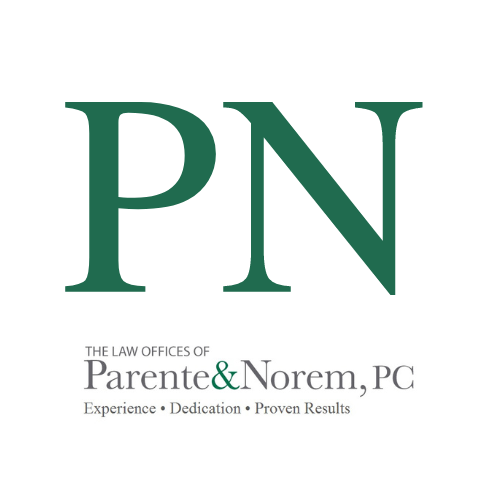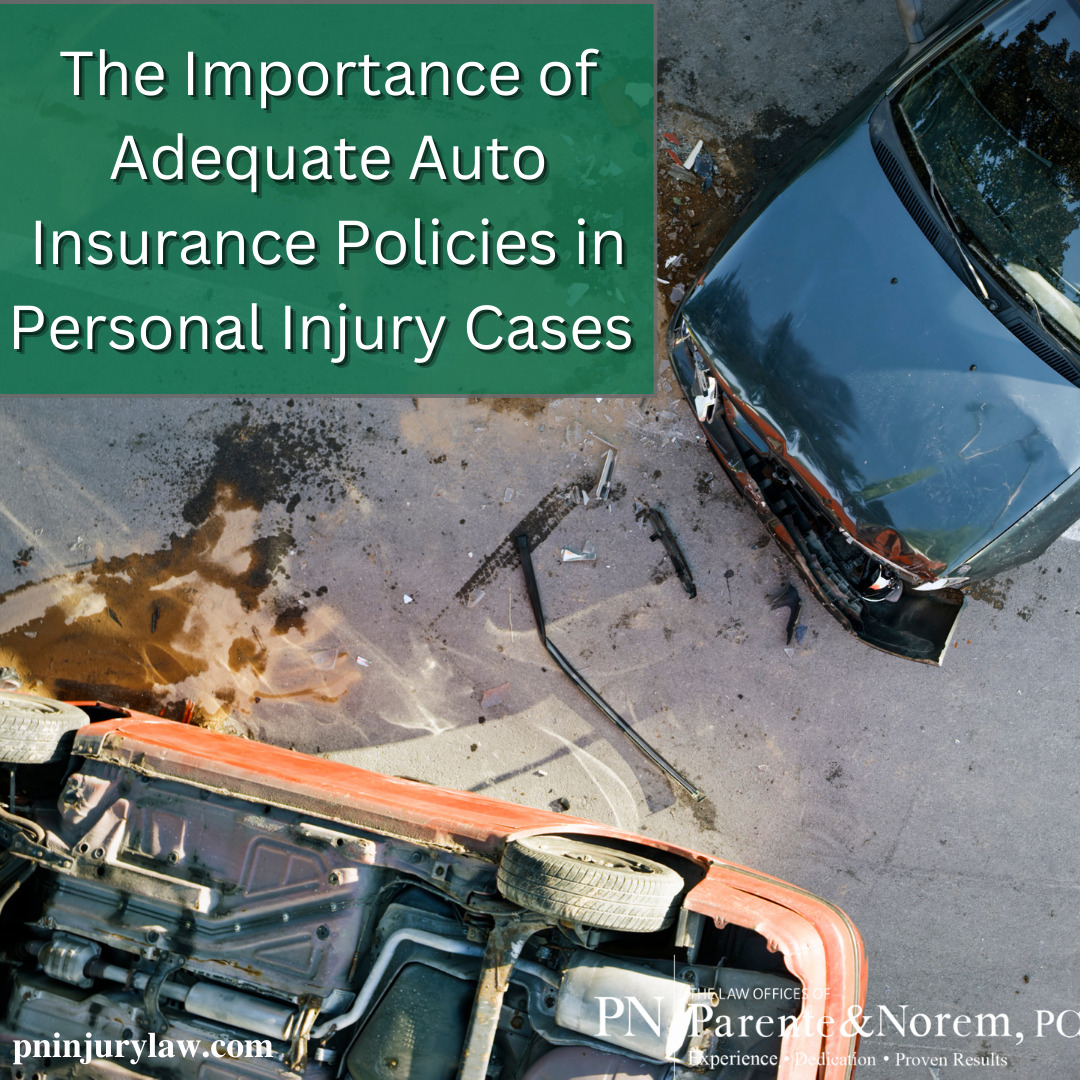
P&N BLOG | The Importance of Adequate Auto Insurance Policies in Personal Injury Cases
Car accidents can happen to anyone, anywhere, and anytime. Injuries can range from minor bruises to life-changing disabilities that require lifelong medical care. When you are involved in an accident, the insurance policies you have will determine the compensation you will receive for your injuries and damages incurred. In Illinois, having adequate auto insurance coverage is crucial, especially in personal injury cases. This blog will emphasize the importance of having sufficient auto insurance coverage for personal injury cases in Illinois.
Importance of Auto Insurance Policies
Auto insurance policies are essential because they provide coverage for injuries and damages incurred in accidents that are the insured’s responsibility. It compensates injured parties who suffered various losses, including medical expenses, lost wages, pain, and suffering, and other economic and non-economic damages. Auto insurance policies provide a safety net for unforeseen events that could occur while driving.
The State of Illinois Auto Insurance Law
In Illinois, it is mandatory to have basic auto insurance coverage, which consists of minimum liability insurance limits of 25/50/20. This means that for an accident-caused by the insured, the insurance company will pay up to $25,000 for bodily injury per person, $50,000 for all injured persons in an accident, and up to $20,000 for property damage. However, these minimum limits may not be enough to cover damages and injuries that result from accidents that are at or beyond the limits of your insurance policy. Therefore, it is crucial to have adequate insurance coverage in case of personal injury cases.
The Importance of Having An Adequate Auto Insurance Policy
In Illinois, personal injury cases are initiated by making claims towards the at-fault party’s insurance company. In the case that the at-fault party’s insurance limits are insufficient to cover your damages and injuries adequately, you need to have the most extensive coverage available under your insurance policy to contain the further costs that you may incur.
It is essential to consider high-limit insurance policies that offer coverage beyond the Illinois minimum liability limits. Moreover, you can also consider purchasing added protection, such as underinsured or uninsured motorist coverage, to protect you in the case of an accident caused by an uninsured or underinsured driver. This extra coverage can be the difference between significant financial hardship or just a minor inconvenience in the event of an accident.
Auto insurance policies are critical to mitigating the damages and costs incurred following a car accident. In Illinois, personal injury claimants rely primarily on the insurance policies of the at-fault party to receive compensation for their damages and injuries. Therefore, it is crucial to have adequate auto insurance coverage to protect you from financial hardship that could arise from an accident. Having high-limit coverage and supplementary coverage, in addition to the mandatory minimum requirements, are essential to ensure that you are fully protected during an accident. So be sure to get yourself the best insurance policy for your driving needs and have peace of mind when you’re behind the wheel.
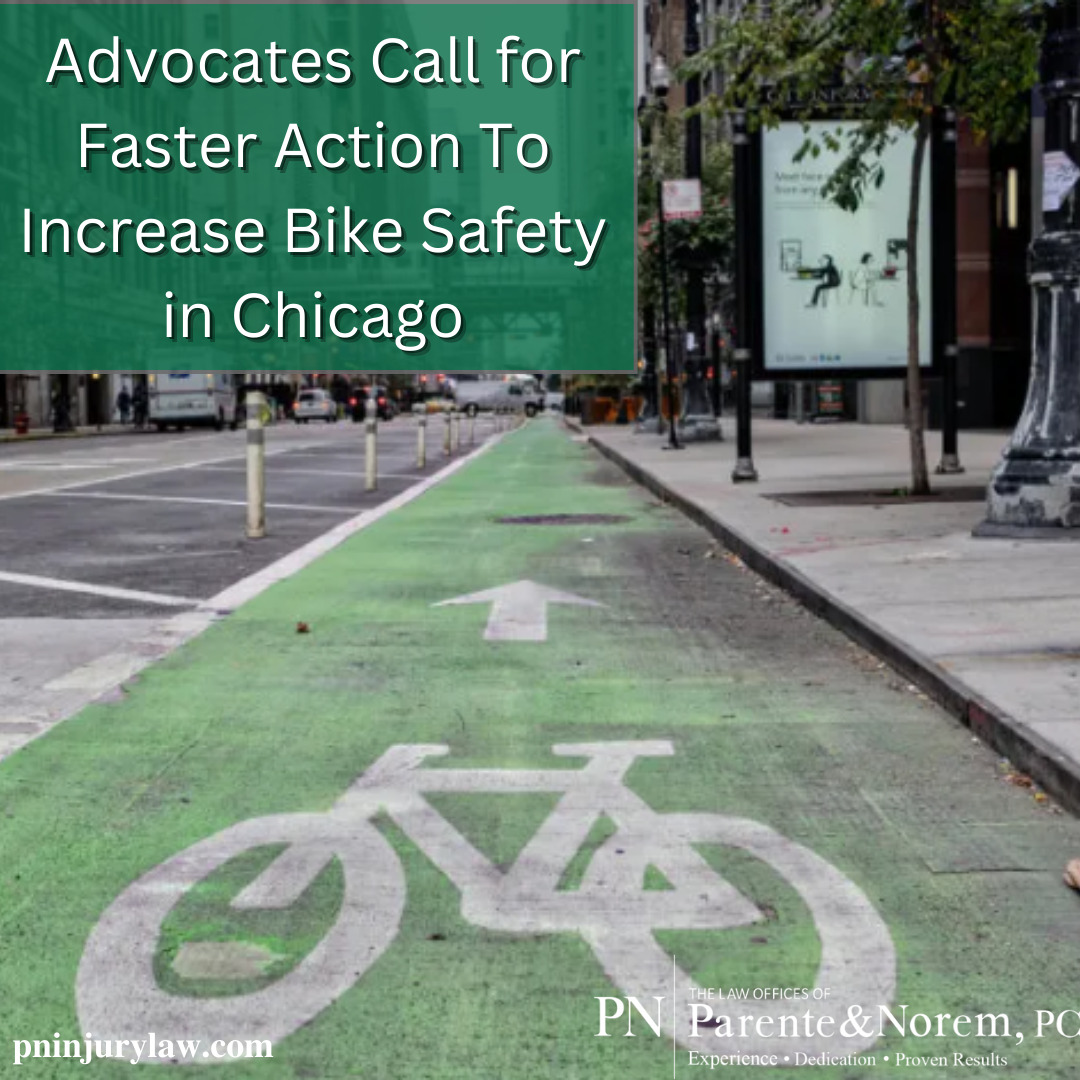
P&N BLOG | Report: Advocates Call for Faster Action To Increase Bike Safety in Chicago
In a recent report published by the Chicago Sun-Times, Chicago’s bike safety crisis remains a pressing concern for cyclists, with recent statistics highlighting the urgent need for enhanced cycling infrastructure. Anne Alt, president of the Chicago Cycling Club, still vividly remembers a traumatic incident nearly two decades ago, when she was thrown off her bike due to a parked vehicle’s open door. Despite this, and countless similar accidents over the years, progress in improving bike safety has been sluggish in the city.
The pandemic further exacerbated the issue, as Chicago lagged behind other cities in taking decisive measures to make its streets safer for cyclists. The numbers tell a grim story: in the year up to August 26, there were 1,186 traffic crashes involving cyclists – a staggering 30% increase compared to the same period the previous year.
Chicago’s ranking in bike safety, placed at 161 out of 163 large cities by PeopleForBikes, highlights the urgency of the matter. The city received a mere rating of 7, a far cry from the average score of 27 for all cities assessed. The pressing need for better infrastructure is evident – protected bike lanes have been proven to increase ridership and create a safer environment for both cyclists and motorists.
Rebecca Davies, an expert from PeopleForBikes, emphasized the importance of reducing speed limits on major roads as a means to improve safety. Studies indicate that even a slight reduction in speed limits can drastically decrease the likelihood of injuries and fatalities. Chicago’s Department of Transportation plans to implement these changes, including narrowing travel lanes to encourage slower driving speeds and reallocating space to better accommodate pedestrians, cyclists, and public transit users.
Chicago’s “Chicago Cycling Strategy” released in 2023 outlines ambitious plans for the installation of 150 miles of new and upgraded cycling infrastructure over the next few years. These plans prioritize the creation of protected bike lanes and neighborhood greenways accessible to cyclists of all skill levels, aiming to establish a bike-friendly environment for all residents. Nevertheless, critics point out that previous plans have fallen short, emphasizing the importance of accountability and swifter implementation to avoid repeating past mistakes.
As advocates demand greater progress, a transformative vision for Chicago’s streets is proposed. The organization “Chicago Bike Grid Now!” envisions a network of dedicated cycling routes spanning at least 450 miles – approximately 10% of the city’s streets. The plan also includes traffic-calming measures such as lowered speed limits, speed humps, raised crosswalks, curb extensions, and narrower roads to create a safer urban landscape for all.
Chicago’s bike safety concerns have reached a critical juncture, demanding prompt action to prevent further accidents. The current landscape underscores the necessity of prioritizing cycling infrastructure improvements, including protected bike lanes, reduced speed limits, and a comprehensive network of dedicated bike routes. As advocates and officials strive to collaborate for a safer Chicago, the hope is to create an environment where cyclists can ride without fear, and motorists can navigate streets with clarity and confidence.
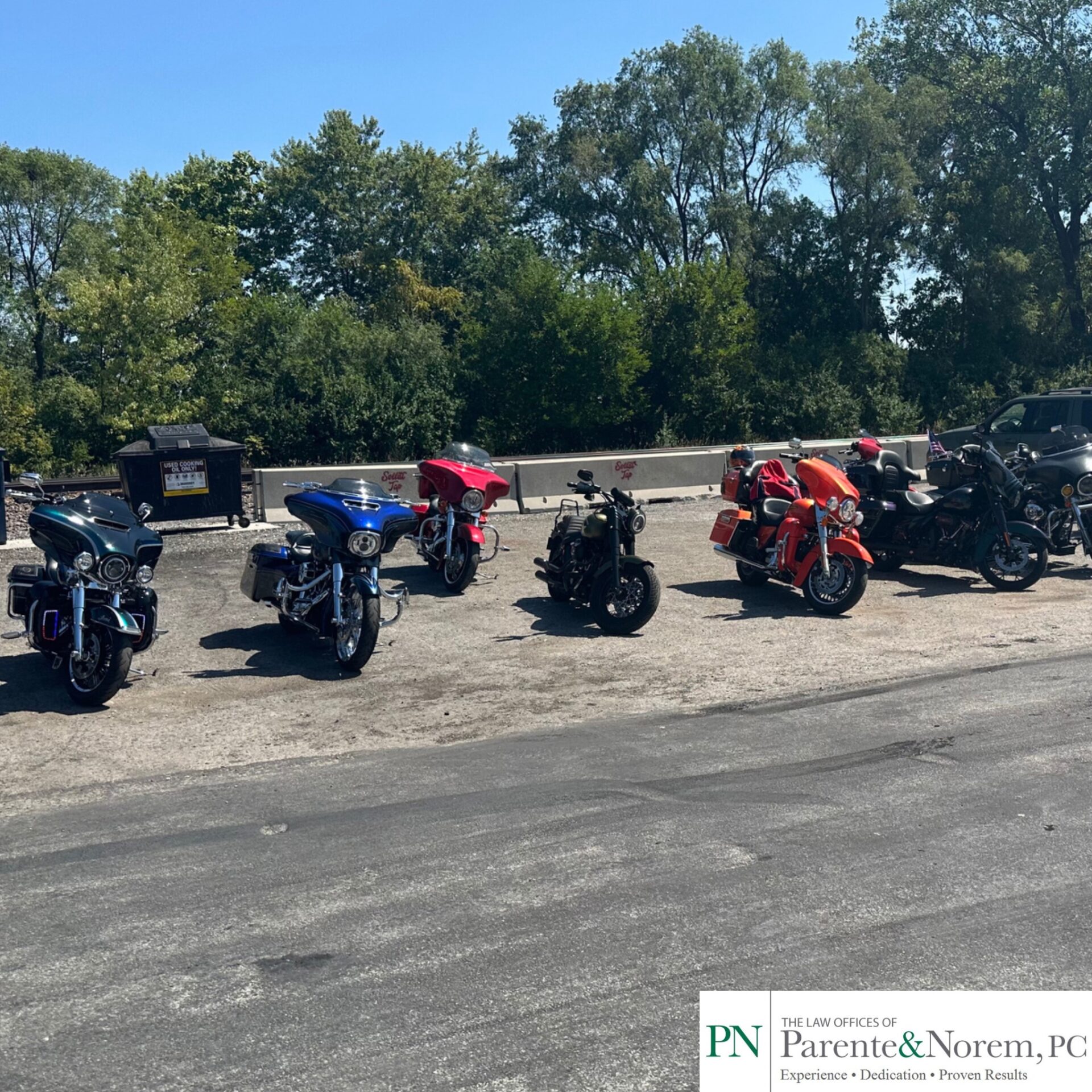
P&N BLOG | The Law Offices of Parente & Norem, P.C. Supports IUOE 150 Bike & Classic Car Run

The Law Offices of Parente & Norem, P.C. was proud to support IUOE 150 Bike & Classic Car Run! Held on Sunday, August 27, this event started at their District 2 Hall in Joliet, Illinois, and ended at their Training Center in Wilmington, Illinois.
This annual event benefits the IUOE 150 Scholarship Fund, which is a program that awards scholarships to dependents of active 150 members. These scholarships are awarded to students getting their undergraduate degree, as well as those attending a technical school.
This year our Public Relations team set up at one of the stops in Beecher, Illinois to visit with participants. The weather was beautiful, and overall it was a great day visiting with all the union representatives, members, friends and family.
For more information on The Law Offices of Parente & Norem, P.C. or speak to an attorney, call/text us at 312.641.5926 or visit us at pninjurylaw.com

P&N BLOG | The Frequency of Traumatic Brain Injuries in Car Accidents
Car accidents are a distressingly common occurrence on the roads of Illinois and the rest of the United States. The consequences of these accidents can be severe, ranging from property damage to debilitating injuries. One of the most concerning injuries resulting from car accidents is traumatic brain injury (TBI). In this blog post, we’ll look into the statistics and insights from various sources to shed light on the frequency and severity of traumatic brain injuries in car accidents.
Understanding the Statistics
According to The National Library of Medicine, a compilation of 11 studies encompassing 2,769 patients involved in accidents with pedestrians, motorcycles, or cars, car accidents were responsible for 43% of traumatic brain injuries (TBI). This figure is higher compared to motorbike accidents at 30% and pedestrian accidents at 27%. Interestingly, when considering studies that included pedal bicycles, car accidents dropped slightly to 40%, while motorbike and pedestrian accidents were both associated with 23% of TBI cases. Pedal bike accidents accounted for 14% of traumatic brain injuries.
Another study underscores the gravity of the situation by highlighting that while car accidents contribute to approximately 14% of all TBI cases in the US, they are the leading cause of TBI-related deaths among children and young adults. This sobering fact emphasizes the urgent need to address the issue of traumatic brain injuries resulting from car accidents.
The Hidden Complexity of TBIs
What makes traumatic brain injuries resulting from car accidents even more alarming is that they can occur even without a direct impact to the head. As explained in Source 2, the physical force generated by a collision can actually move the brain within the skull, leading to injury. This is why it’s imperative that individuals involved in car accidents seek medical attention, even if they don’t believe they’ve experienced a significant head impact.
Deeper Insights from Research
A study published in the academic journal Brain Communications, offers an in-depth perspective on the relationship between road traffic collisions and traumatic brain injuries. A study involving over 2,000 collisions in Great Britain’s Road Accident In-depth Studies database revealed that approximately 20.2% of casualties sustained a traumatic brain injury. This includes varying degrees of severity, from mild to moderate-severe injuries.
The study’s findings also highlighted key patterns in traumatic brain injuries resulting from car accidents. Notable pathologies included skull fractures, subarachnoid hemorrhage, focal brain injuries, and subdural hematomas. The study emphasized the role of velocity change (delta-V) in influencing brain injury risk. Higher delta-V values were associated with an increased risk of moderate-severe brain injuries across all road user types.
Interestingly, the study found that pedestrians and cyclists were at a higher risk of moderate-severe brain injuries compared to car occupants when accounting for delta-V. Wearing a cycle helmet was found to provide protective benefits, particularly against skull fractures and subdural hematomas.
Taking Action for Safer Roads
These insights from various sources underscore the importance of addressing traumatic brain injuries resulting from car accidents. Whether you’re a driver, passenger, pedestrian, or cyclist, the risks are significant. While modern vehicles are equipped with collision notification systems, there’s always room for improvement in road safety.
If you or a loved one have been involved in a car accident and suspect a traumatic brain injury, seeking immediate medical attention is crucial. Additionally, consulting with legal professionals experienced in personal injury cases can help ensure that you receive the compensation you deserve for medical expenses, pain and suffering, and more.
The frequency and severity of traumatic brain injuries in car accidents cannot be underestimated. By understanding the statistics, complexities, and risk factors associated with TBIs, you can make informed decisions to stay safe on the road and seek appropriate assistance in the unfortunate event of an accident. Your health and well-being are paramount, and taking proactive steps can contribute to safer roads for everyone.
If you or a loved one have suffered a traumatic brain injury due to another’s negligence, contact The Law Offices of Parente & Norem, P.C. today at 312.641.5926 or fill out a contact form here on our website.

P&N BLOG | Key Terms and Concepts for Navigating Your Personal Injury Claim
If you’ve found yourself reading this, chances are you or a loved one are facing the daunting prospect of a personal injury claim. We understand that this can be a confusing and overwhelming experience, especially when legal jargon starts flying around. Fear not, for we’re here to demystify the process and empower you with knowledge. In this guide, we’ll define and explain essential terms and concepts you need to know to navigate the world of personal injury claims in Illinois.
Personal Injury Claim
A personal injury claim arises when an individual suffers harm due to another party’s negligence, recklessness, or intentional actions. This harm can be physical, emotional, or financial in nature.
Negligence
Negligence refers to the failure to exercise reasonable care, resulting in harm to another person. To establish a personal injury claim, you must prove that the other party owed you a duty of care, breached that duty, and directly caused your injuries as a result.
Duty of Care
This is the legal obligation that individuals and organizations have to act in a manner that prevents harm to others. For example, drivers have a duty to follow traffic laws and drive responsibly to avoid accidents.
Breach of Duty
A breach of duty occurs when someone fails to uphold their duty of care. For instance, if a property owner neglects to repair a hazardous condition on their premises, resulting in an injury, they may be considered to have breached their duty of care.
Causation
To succeed in a personal injury claim, you must prove that the defendant’s breach of duty directly caused your injuries. This involves demonstrating a clear link between their actions (or lack thereof) and the harm you suffered.
Damages
Damages are the losses and harms you’ve experienced as a result of the accident. These can include medical bills, lost wages, pain and suffering, emotional distress, and more.
Statute of Limitations
The statute of limitations is the time limit within which you must file a personal injury lawsuit Failing to file within this timeframe may result in losing your right to seek compensation.
Comparative Negligence
Illinois follows a comparative negligence rule, which means that even if you were partially at fault for the accident, you can still recover damages. However, your compensation may be reduced in proportion to your level of responsibility.
Pre-existing Conditions
If you had a pre-existing medical condition that was worsened by the accident, you may still be eligible for compensation. However, it’s important to differentiate between the pre-existing condition and the new injuries caused by the accident.
Demand Letter
A demand letter is a written communication from your attorney to the at-fault party or their insurance company, outlining the details of your claim, the extent of your damages, and the compensation you’re seeking. It’s a critical step before filing a lawsuit.
Settlement
A settlement is an agreement reached between you and the at-fault party or their insurance company, usually before a lawsuit goes to trial. It involves you accepting a certain amount of compensation in exchange for dropping any further legal action.
Litigation
Litigation refers to the process of taking a legal dispute to court. If negotiations and settlements fail, your case may proceed to litigation, where a judge or jury will determine the outcome.
Trial
A trial is the formal process during which both sides present their evidence and arguments to a judge and/or jury. This occurs when a settlement cannot be reached, and a decision must be made by the court.
Compensatory Damages
These are monetary awards intended to compensate you for actual losses incurred due to the accident. Compensatory damages can be economic (quantifiable, like medical bills and lost wages) or non-economic (subjective, like pain and suffering).
Punitive Damages
In rare cases, punitive damages may be awarded to punish the defendant for particularly reckless or malicious behavior. These damages go beyond compensation and aim to deter similar conduct in the future.
Insurance Adjuster
An insurance adjuster is a representative of the insurance company responsible for assessing the value of your claim. Remember, their goal is to minimize the amount the insurance company pays out, so it’s wise to have your own legal representation.
Deposition
A deposition is a formal interview conducted under oath as part of the discovery process. Both parties’ attorneys can question witnesses, including the parties involved, to gather information and evidence for the case.
Mediation
Mediation is an alternative dispute resolution process where a neutral third party helps both sides negotiate a settlement. It can be a less adversarial and time-consuming way to resolve a claim.
Contingency Fee
Many personal injury attorneys work on a contingency fee basis, which means they only get paid if you win your case. Their fees are a percentage of the compensation you receive, making legal representation more accessible.
Initial Consultation
This is your first meeting with a personal injury attorney. During this meeting, you’ll discuss the details of your case, your injuries, and your potential legal options. It’s a crucial step in determining whether you have a viable claim.
Navigating a personal injury claim can be complex, but armed with these key terms and concepts, you’re better equipped to understand the process and make informed decisions. Remember, seeking legal counsel early on can significantly increase your chances of receiving fair compensation for your injuries and losses. If you’re in Illinois and need guidance on a personal injury claim, our experienced team is here to help. Contact The Law Offices of Parente & Norem, P.C. at 312.641.5926 or fill out the contact form here on our website for a free consultation, and let’s work together to secure the justice you deserve.
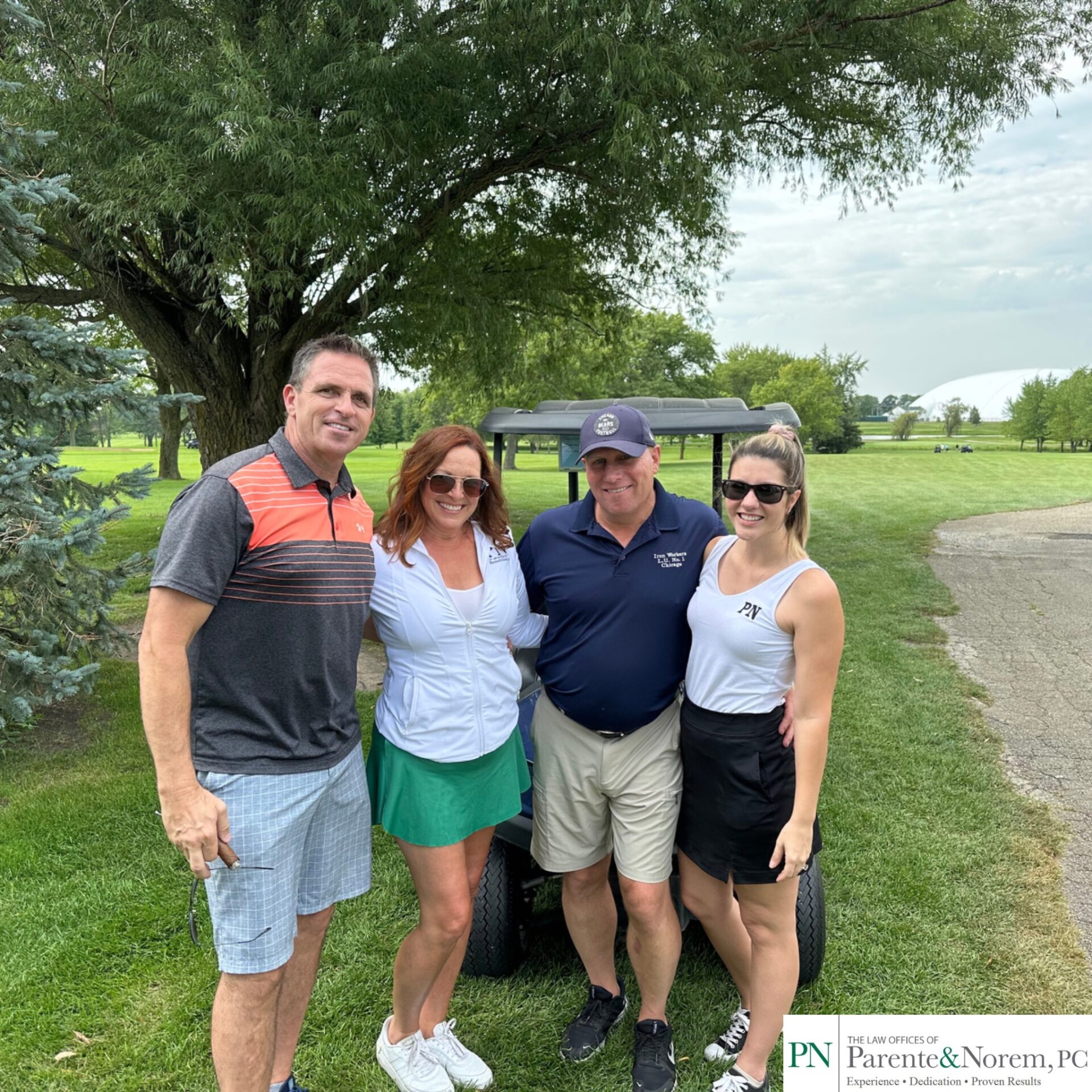
P&N BLOG | The Law Offices of Parente & Norem, P.C. Supports The Walter ‘Babe’ Satalic Charity Golf Outing
The Law Offices of Parente & Norem, P.C. was proud to support Ironworkers Local 1 “Babe” Satalic Golf Outing! This outing was held on Friday, August 25th, 2023 at Green Garden Country Club in Frankfort, Illinois.
This outing benefits multiple local charities, including the YMCA Camp Independence in Lake County. This program teaches self-reliance to spina bifida patients. They also support the Park Forest Senior Services, which is a program through the Community Center that offers a food pantry, senior exercise classes, door to door travel, and other programs for the seniors of Forest Park, Illinois.
This was their first major event since their new President was elected, and was a great opportunity to visit with their newly elected officials. Overall it was a beautiful day that combined laughs, golf, and giving back for a great cause.
For more information on The Law Offices of Parente & Norem, P.C. or speak to an attorney, call/text us at 312.641.5926 or visit us at pninjurylaw.com

P&N BLOG | Staying Focused While Driving – The Ultimate Guide to Safe & Mindful Travel
As summer comes to an end, and we’re all looking for one last getaway before fall arrives, the allure of road trips and scenic drives becomes all the more enticing. However, amidst the excitement of hitting the open road, it’s paramount to remember that safety should always take precedence. Distracted driving and speeding are not just risky behaviors; they are potentially life-threatening actions that can have devastating consequences for both the driver and others on the road. In a recent report, AAA highlighted the importance of staying focused while driving and the dire consequences of neglecting this responsibility. In this blog post, we’ll cover actionable strategies to maintain your focus behind the wheel, drawing insights from local news sources and experts.
AAA has issued a crucial call to action: slow down and stay focused. Edward Hickey, AAA Fleet Operations Manager, emphasizes the significance of remaining attentive while driving. He cautions against letting distractions like phones, food, and drinks divert our attention away from the road. While the allure of a quick bite or a glimpse at our devices may seem innocuous, the reality is that a split second of distraction can lead to dire consequences.
This message is a sobering reminder that every action on the road has a reaction. The aftermath of a distracted or high-speed maneuver can be catastrophic, affecting not just the driver, but also innocent bystanders. The recent tragedy on I-695 near Baltimore that claimed the lives of six construction workers is a haunting example of this reality. The crash serves as a stark reminder that recklessness on the road can shatter lives and families in an instant.
The Importance of Slowing Down in Construction Areas
While summer is on the way out, the roadwork season is still going strong, and this underscores the importance of obeying speed limits, especially in construction zones. Hickey also laments in his report the devastating impact of such incidents, highlighting that the consequences ripple beyond the immediate victims. Families of those affected by accidents like these experience lasting pain and suffering, often with no justification for such avoidable calamities.
Strategies for Staying Focused
Put Your Phone Away: Your phone can wait. When driving, keep your phone out of reach and out of sight. Use hands-free devices only when absolutely necessary.
Plan Ahead: Before hitting the road, make sure you have your route planned out. This reduces the need to fiddle with navigation apps or maps while driving.
Eat and Drink Responsibly: If you’re hungry or thirsty, pull over safely to a rest area or parking lot to enjoy your meal or beverage.
Minimize Distractions: Keep conversations with passengers light and brief. Remember, your primary responsibility is to focus on the road.
Use Technology Wisely: If your vehicle is equipped with driver-assistance technology, use it to your advantage. Features like lane departure warnings and adaptive cruise control can aid in maintaining focus.
Take Breaks: On longer journeys, schedule regular breaks to stretch, rest, and recharge. Fatigue is a significant detractor from focus.
Educate Passengers: If you have passengers, encourage them to respect your need for concentration. They can help create a conducive environment for safe driving.
As the end of summer beckons us to explore new horizons, let’s not forget the paramount importance of staying focused while driving. The tragic incidents highlighted by AAA serve as stark reminders that the consequences of distracted and high-speed driving are far-reaching and irreversible. By following the strategies outlined in this blog, you’re not only safeguarding your well-being, but also contributing to safer roads for everyone. Remember, every journey begins with a conscious commitment to prioritize safety, focus, and responsibility. So, slow down, stay focused, and embark on your summer adventures with a renewed sense of mindfulness and caution.
If you or a loved one have been injured due to another’s distracted driving and negligence, call/text us at the Law Offices of Parente & Norem, P.C. today at 312.641.5926 or fill out a contact form here on our website.
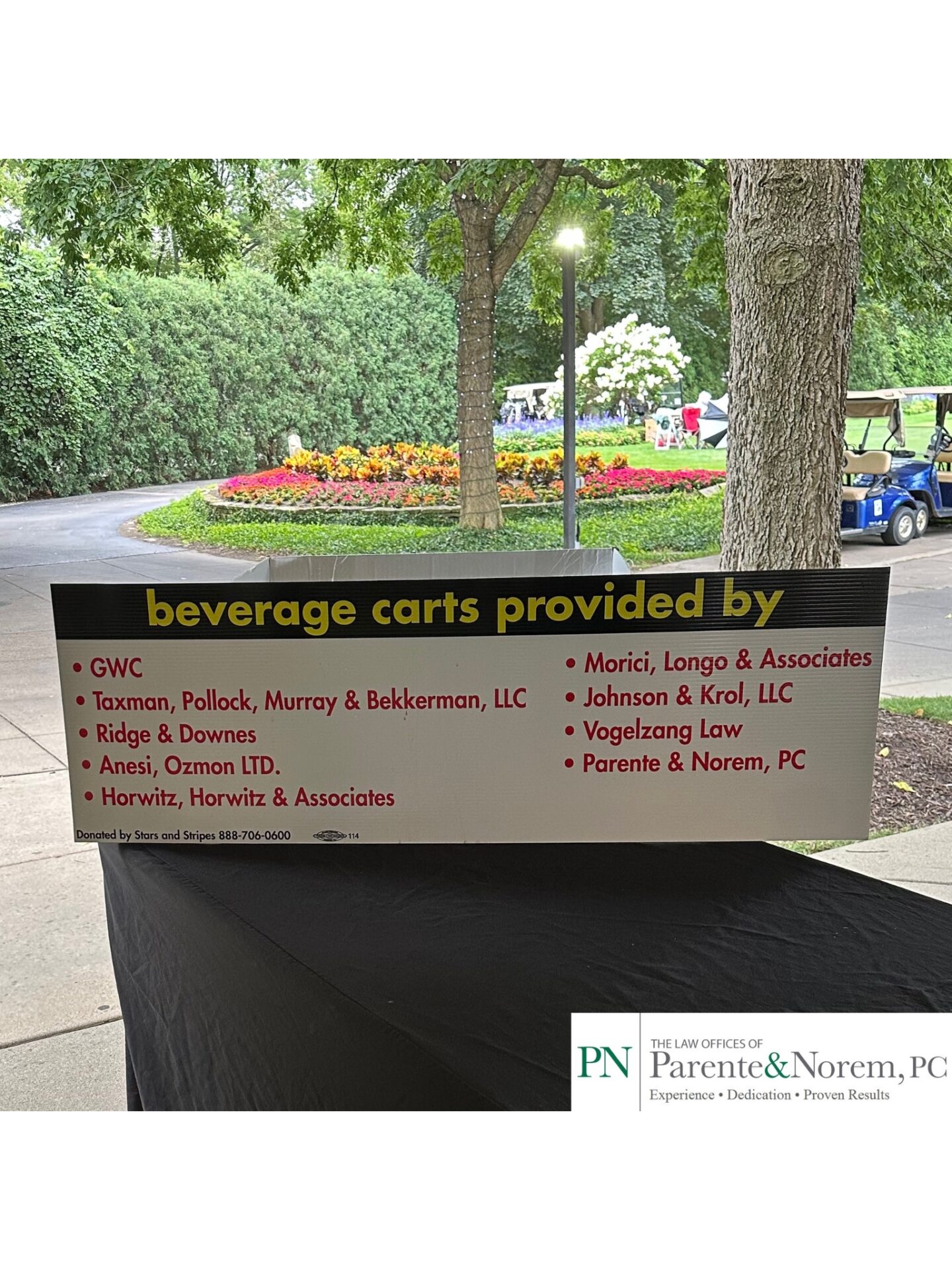
P&N BLOG | The Law Offices of Parente & Norem, P.C. Supports Lake County Building Trades Golf Outing
The Law Offices of Parente & Norem, P.C. was proud to support the Lake County Building Trades Golf Outing! This outing was held at Chevy Chase Golf Club in Wheeling, Illinois on Monday, August 14.
This outing funds the Building Trades “Adopt-a-Sailor” program, which gives back to the men and women of the Navy. It also benefits their Easter meal giveaways, which provides hams and Easter dinners for local people in need in Lake County.
While the rain did not hold off, the golfers managed to get in most of their round and still have a great time. We are so grateful for the great turn out of local politicians, contractors, and tradesman despite the weather.
For more information on The Law Offices of Parente & Norem, P.C. or speak to an attorney, call/text us at 312.641.5926 or visit us at pninjurylaw.com

P&N BLOG | The Law Offices of Parente & Norem, P.C. Supports McHenry County Building Trades Golf Outing
The Law Offices of Parente & Norem, P.C. was proud to support the McHenry County Building Trades Golf Outing! This outing was held at Crystal Woods Golf Club in Woodstock, Illinois on Friday, August 11.
This annual outing uses the proceeds to support multiple charities that are local to the area, including the Sage YMCA in Crystal Lake, Illinois and the Midwest Shelter for homeless veterans.
Besides the extreme wind, it was a beautiful day of golf and networking with the the local trades of McHenry County. We are grateful to be able to participate in a day of golf, camaraderie, and philanthropy.
For more information on The Law Offices of Parente & Norem, P.C. or speak to an attorney, call/text us at 312.641.5926 or visit us at pninjurylaw.com

P&N BLOG | The Crucial Role of Evidence Gathering To Maximize Your Personal Injury Claim
Accidents happen when we least expect them, leaving us with physical injuries, emotional trauma, and financial burdens. If you’ve been injured due to someone else’s negligence, it’s vital to understand the significance of gathering evidence in the aftermath. The first few days following an accident are pivotal, as they can determine the strength of your potential personal injury claim. In this blog post, we’ll delve into the importance of evidence collection and how it can make a world of difference in your pursuit of rightful compensation.
Why Evidence Matters When Building a Strong Personal Injury Case
The journey to compensation begins with evidence, the cornerstone of any personal injury claim. Evidence provides the foundation upon which your case rests. It empowers you to establish the following critical points:
Fault Identification: Determining who is responsible for the accident is essential for obtaining compensation. Your evidence can point directly to the party at fault, proving their negligence or carelessness.
Liability Establishment: To win a personal injury case, you must show that the other party was negligent and that this negligence directly led to your injuries. Strong evidence solidifies your claim and increases your chances of success.
Damage Documentation: Comprehensive evidence demonstrates the extent of your injuries and the damages you’ve suffered. This includes physical injuries, medical bills, emotional distress, and lost wages.
Causation Proof: Your evidence must show a clear cause-and-effect relationship between the other party’s negligence and your injuries. This establishes the link between their actions and your suffering.
Negotiation Leverage: Strong evidence gives you a powerful bargaining chip when negotiating with insurance companies or in court. It showcases the strength of your case and can lead to more favorable settlements.
Types of Evidence to Gather
Now that we understand the importance of evidence, let’s delve into the specific types you should gather:
Scene or Accident Evidence: If possible, return to the scene of the accident promptly. Photograph and document any conditions that may have contributed to the incident, such as worn-out surfaces, broken equipment, or malfunctioning lights. These seemingly insignificant details can later play a crucial role in proving negligence.
Physical Evidence: Tangible proof, such as broken items, damaged vehicles, or torn clothing, can substantiate your claims. It’s important to preserve physical evidence as it was at the time of the accident, or take clear photographs if preservation is not possible.
Medical Records: Comprehensive medical records detailing your injuries, treatments, and prognosis are essential. They serve as concrete evidence of the extent of your injuries and the costs associated with your recovery.
Witness Testimonies: Eyewitness accounts are powerful tools in supporting your version of events. Speak to anyone who saw the accident unfold, and gather their contact information for future reference.
Documents: Keep all relevant documents, such as accident reports, insurance correspondence, medical bills, and receipts. These documents create a paper trail that reinforces your claims.
Expert Opinions: Depending on the complexity of your case, expert opinions may be crucial. Professionals in relevant fields can provide insights that strengthen your argument, especially when dealing with intricate medical issues or technical details.
Photos and Video: Visual evidence, including photographs and videos of the accident scene, injuries, and damaged property, can provide undeniable proof of the events.
Preserving Your Evidence
Equally vital as gathering evidence is preserving it effectively. Here are some guidelines to ensure your evidence remains intact and accessible:
Backup and Store: Digitize your evidence, such as photos and videos, and store them securely on a reliable device or cloud storage. Physical evidence should be stored in a safe place where it won’t deteriorate or be tampered with.
Organize Chronologically: Arrange all documents, medical records, and correspondence chronologically. This makes it easier for you and your legal team to present a coherent narrative.
Consult with an Attorney: Enlisting the expertise of a personal injury lawyer is invaluable. They can guide you through the evidence collection process, provide legal advice, and ensure you’re on the right track.
Gathering evidence is the bedrock of a successful personal injury claim. It’s a meticulous process that requires attention to detail, organization, and diligence. By following these guidelines and enlisting the support of the skilled personal injury attorneys at The Law Offices of Parente & Norem, P.C., you’ll be equipped to build a compelling case that maximizes your chances of obtaining the compensation you deserve. Remember, your evidence can speak volumes when words fall short—so don’t underestimate its significance.
If you or a loved one have been injured by another’s negligence, call/text The Law Offices of Parente & Norem, P.C. today at 312.641.5926 or fill out a contact form here on our website.
